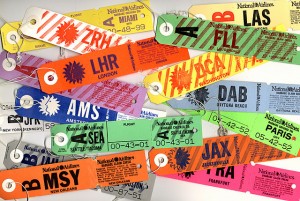Working the Ramp
A new book chronicles the ins-and-outs of being a baggage handler
/https://tf-cmsv2-smithsonianmag-media.s3.amazonaws.com/filer/c2/91/c2911603-accc-4ae3-b89b-ab146670106a/1280px-baggagehandlingeasyjetarp.jpg)
They work in all weather loading and unloading your suitcases, the mail, freight, even dead bodies and wild and domestic animals. They deice the airplane in winter, and clean it between each flight. So spare a thought for the airline industry's baggage handlers.
Liesl Miller Orenic, an associate professor of history at Dominican University, has written a book on the topic, titled On the Ground: Labor Struggle in the American Airline Industry. Why baggage handlers, or "ramp agents" as they are known within the industry? Their work is categorized as "unskilled," yet this group built a powerful alliance with their "skilled" coworkers, the aircraft mechanics, to improve their working conditions and wages. In her book, Orenic (who worked as a baggage handler for American Airlines and American Eagle at O'Hare Airport in Chicago) charts labor relations from the airline industry's inception to deregulation.
George Poulos, who worked for American Airlines in 1956 in Chicago, remembers the introduction of jet aircraft, and how he and several coworkers made a special trip to Los Angeles to see the new DC-707s. He told Orenic that he wondered how something so large would get off the ground.
Jet aircraft transformed commercial aviation, even down to baggage handling. With the introduction of jets, freight and baggage systems became automated, reducing the numbers of handlers at airports. Working the ramp became far more dangerous; the decibel level of a jet engine was twice as loud as the rate considered safe for the human ear, and jet engines could suck in a person standing near them.
The work was determined by the seasons. "In the winter," Orenic writes, "airplanes needed to be deiced. At Christmas, more baggage handlers were needed in the post-office and freight operations. In the summer, passenger travel usually increased with school vacations.... Several times a year, baggage handlers participated in a stationwide bid for new positions in their job category.... Through shift bids, baggage handlers could work with new coworkers every three or four months or could choose to work with the same four or five people year after year if their seniority permitted. This flexibility was one of the most attractive parts of the job.... For Rob Kranski, bidding different jobs 'kept it interesting.' Over the years he worked in the freight house, at the terminal gates, in overnight cabin service, in the packing room preparing pillows, blankets, and movie headsets, and deicing aircraft."
Read a current baggage handler job description here, or watch the Discovery Channel's Mike Rowe attempt to work the ramp on "Dirty Jobs."
